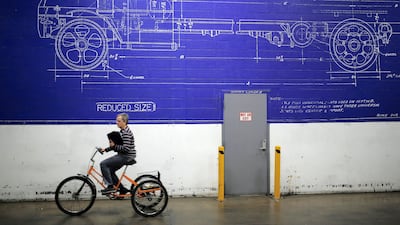Diesel's day is done if the headlines are to be believed. But an Egyptian scientist is among those who believes that the technology involved, if not the unloved fuel itself, will be with us awhile yet.
Dimethyl Ether (DME) might not roll off the tongue, but could just be the 'clean diesel' that will keep the old-school compression engines used in trucks, buses, farm vehicles and many cars on the road. The biofuel is derived from methane, a common by product of decomposing organic material such as agricultural waste and coal.
As a fossil fuel, diesel is now deeply unpopular with the public because of the toxins it emits. Some countries now want to phase it out completely in the coming decades, opening the way for alternative fuels.
"Diesel fuel is finite and the world will eventually run out of oil and gas, quite possibly by the second half of this century," says Ahmed Osman Ahmed, an Egyptian researcher now based at Queens University in Belfast, where he is working on DME catalysts. "As a result, there is a real need [for] clean renewable energy sources."
Mr Osman says DME has a sweet odor and burns with a visible blue flame. It produces virtually no toxins, unlike fossil fuels. DME is also easy to transport and store, as it is a gas with properties similar to those of propane. However, it can also be stored as liquid under moderate pressure.
"It can be used for cooking and heating as a replacement for propane – aka liquid petroleum gas - or in transportation as a fuel in cars or even in the power generation to produce electricity," Mr Ahmed says.
He believes it will be especially beneficial to developing countries such as Egypt, where landfill biogas could be tapped as the feedstock for DME.
While many are betting on electric vehicles to supplant old-school gas guzzlers, some in the industry foresee a continuing value for this new form of diesel, which has been used for more than a century in its conventional form. US-based Oberon Fuels falls into this category, and earlier this year began a program to test DME in collaboration with truck-manufacturers Mack Trucks.
"Compression engines are extremely powerful which is why they have been used around the world for a very long time," says Rebecca Boudreaux, Oberon's president. "DME behaves just like diesel in these engines."
Ms Boudreaux says DME will initially be aimed at heavy duty vehicles but in time is likely to be adopted for electricity generation purposes as well, especially in developing countries. "There's no smoke or fumes and as a bonus it can be made from renewable feedstocks such as food waste."
The transition to DME will also be relatively simple - crucially, manufacturers will be able to adapt their existing diesel motors rather than have to design a totally new power system from scratch.
DME is not a new product; it has been around for decades, used as a propellant in common household aerosols due to its toxic free properties. Countries such as China, Japan, Korea, Egypt, and Brazil have also used it for energy, although the relatively low prices of natural gas, coal and oil have hampered its demand.
As the tide turns against diesel though, alternatives are once-again being sought. Recently the UK and France said they would work towards a ban of sales of new petrol and diesel vehicles by 2040.
This month, India's oil minister Dharmendra Pradhan said state-run companies were investing US$2 billion into research and development of second-generation biofuels. In the US, the world's largest oil consumer at almost 20 million barrels a day, support for biofuels continues in spite of uncertainty over president Donald Trump's views on environmental issues.
Even major oil producers such as Abu Dhabi are venturing into biofuel. In April The National reported that Tadweer, the Centre of Waste Management in Abu Dhabi, will provide permits to companies to take waste oils and produce environmentally friendly alternatives to regular diesel for use in buses and lorries.
It seems then that the momentum in favour of alternative fuels is gaining. One company that is planning for a post-diesel future is Mack Trucks in the US.
The commitment of Mack Trucks to DME is emblematic of the growing enthusiasm for the fuel. The company, acquired by Volvo in 2000, has been sending its heavy-duty haulers out on US roads by the thousands for more than a century.
In January, the company launched a several-week trial of DME-powered Mack Pinnacle truck in collaboration with the New York City Department of Sanitation, for use at the Freshkills Landfill on Staten Island. Together Mack and Oberon are using the exercise to gather data on the use of the fuel in urban, heavy-load fleets.
Actual production of DME-ready vehicles will be determined by the right market conditions for the fueling infrastructure, the engine availability and customer demand, Mack says. But the company is hoping that the new fuel will mean an extended future for diesel-type engines.
"Our long-term outlook on diesel is that it will still be around for many years to come," says Roy Horton, Mack Trucks director of product strategy. "And regarding the engine development, we have proven that the engine technology is capable."

